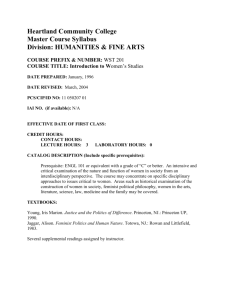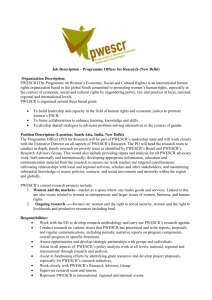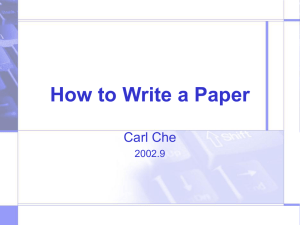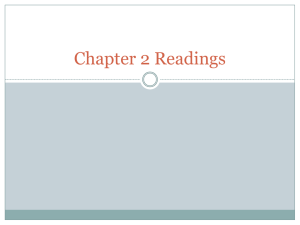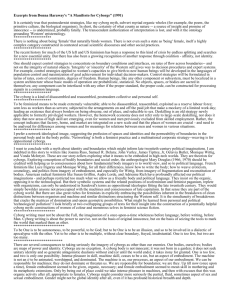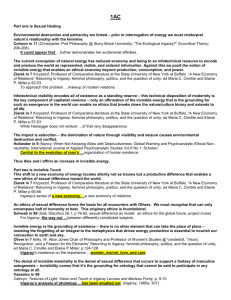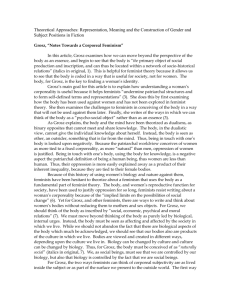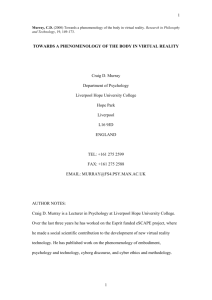Feminist Theories of Embodiment
advertisement
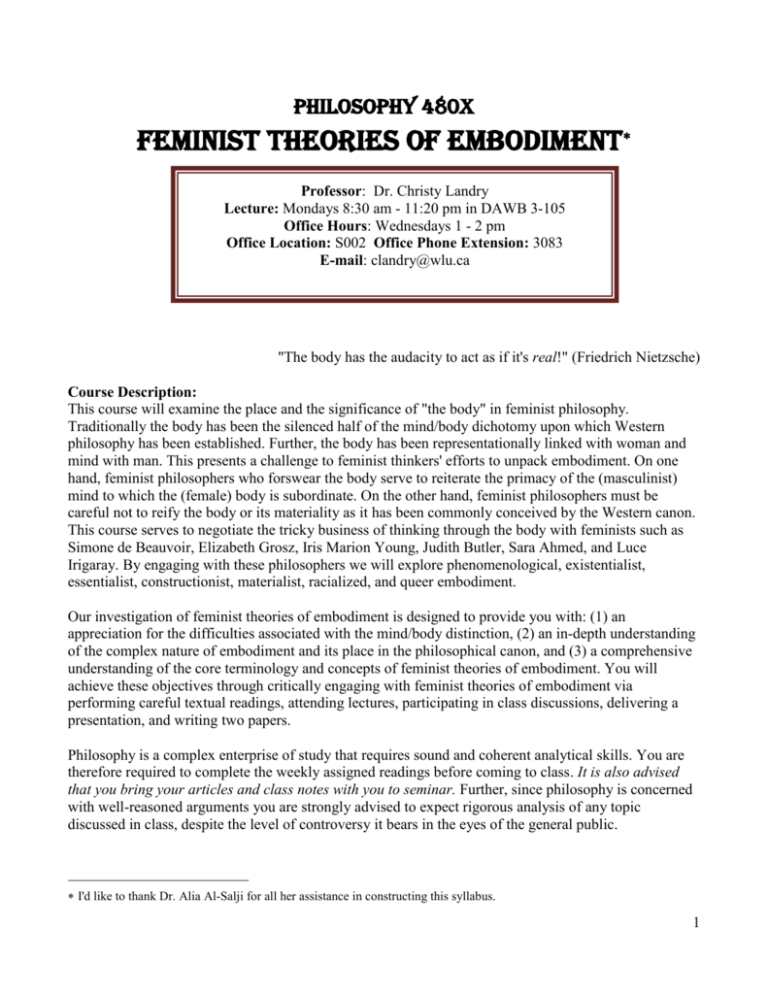
PHILOSOPHY 480X Feminist Theories of Embodiment Professor: Dr. Christy Landry Lecture: Mondays 8:30 am - 11:20 pm in DAWB 3-105 Office Hours: Wednesdays 1 - 2 pm Office Location: S002 Office Phone Extension: 3083 E-mail: clandry@wlu.ca "The body has the audacity to act as if it's real!" (Friedrich Nietzsche) Course Description: This course will examine the place and the significance of "the body" in feminist philosophy. Traditionally the body has been the silenced half of the mind/body dichotomy upon which Western philosophy has been established. Further, the body has been representationally linked with woman and mind with man. This presents a challenge to feminist thinkers' efforts to unpack embodiment. On one hand, feminist philosophers who forswear the body serve to reiterate the primacy of the (masculinist) mind to which the (female) body is subordinate. On the other hand, feminist philosophers must be careful not to reify the body or its materiality as it has been commonly conceived by the Western canon. This course serves to negotiate the tricky business of thinking through the body with feminists such as Simone de Beauvoir, Elizabeth Grosz, Iris Marion Young, Judith Butler, Sara Ahmed, and Luce Irigaray. By engaging with these philosophers we will explore phenomenological, existentialist, essentialist, constructionist, materialist, racialized, and queer embodiment. Our investigation of feminist theories of embodiment is designed to provide you with: (1) an appreciation for the difficulties associated with the mind/body distinction, (2) an in-depth understanding of the complex nature of embodiment and its place in the philosophical canon, and (3) a comprehensive understanding of the core terminology and concepts of feminist theories of embodiment. You will achieve these objectives through critically engaging with feminist theories of embodiment via performing careful textual readings, attending lectures, participating in class discussions, delivering a presentation, and writing two papers. Philosophy is a complex enterprise of study that requires sound and coherent analytical skills. You are therefore required to complete the weekly assigned readings before coming to class. It is also advised that you bring your articles and class notes with you to seminar. Further, since philosophy is concerned with well-reasoned arguments you are strongly advised to expect rigorous analysis of any topic discussed in class, despite the level of controversy it bears in the eyes of the general public. I'd like to thank Dr. Alia Al-Salji for all her assistance in constructing this syllabus. 1 Required Texts: All reading available through ARES unless otherwise indicated Course Evaluation (detailed below): 1. Class Participation, worth 15% of the final grade 2. Three Reflective Commentaries, 5% each for a total of 15% of the final grade 3. Class Presentation, worth 30% of the final grade 4. Term Paper, worth 40% of the final grade Schedule of Readings Week 1: Introduction to Course Elizabeth Grosz, "Refiguring Bodies" from Volatile Bodies Week 2: The Second Sex Simone de Beauvoir, "Introduction" and "The Mother" from The Second Sex Genevieve Lloyd, "The Struggle for Transcendence" Week 3: Feminist Phenomenology Iris Marion Young, "Throwing Like a Girl" Iris Marion Young, "'Throwing Like a Girl:' Twenty Years Later" Diane Chisholm, “Climbing Like a Girl: An Exemplary Adventure in Feminist Phenomenology” Week 4: Disciplined Bodies Michel Foucault, "Docile Bodies" from Discipline and Punish: The Birth of the Prison Sandra Bartky, "Foucault, Femininity, and the Modernization of Patriarchal Power" Susan Bordo, "The Body and the Reproduction of Femininity: A Feminist Appropriation of Foucault" Week 5: Bodies of Sexual Difference Luce Irigaray, "Equal or Different?" Luce Irigaray, "Sexual Difference" Luce Irigaray, "This Sex Which is Not One" Week 6: Critiques of Sexual Difference Elizabeth Grosz, "Sexed Bodies" from Volatile Bodies Judith Butler, "Introduction" from Bodies that Matter Reading Week Week 7: The Lived Body as Sexed and Gendered Judith Butler, excerpts from Bodies that Matter Irene Costera Meijer & Baukje Prins, "How Bodies Come to Matter" 2 Week 8: Material Feminism Elizabeth Grosz, "The Nature of Culture" Elizabeth A. Wilson, "Gut Feminism" Week 9: Material Feminism Debate Sara Ahmed, "Some Preliminary Remarks on the Founding Gestures of the 'New Materialism'" Noela Davis, "New Materialism and Feminism's Anti-Biologism: A Response to Sara Ahmed" Week 10: Queer Embodiment Sara Ahmed, “Orientations towards Objects” and “Sexual Orientation” from Queer Phenomenology Week 11: Racialized Embodiment Alia Al-Saji, “The Racialization of Muslim Veils: A Philosophical Analysis” Linda Alcoff, “Toward a Phenomenology of Racial Embodiment” Week 12: The Future of Embodiment Donna Haraway, "A Cyborg Manifesto: A Cyborg Manifesto Science, Technology, and Socialist-Feminism in the Late Twentieth Century" Rosi Braidotti, "The Politics of Ontological Difference" from Nomadic Subjects Final Paper Due Monday, April 6th by 11:59 pm in the MLS drop box Course Evaluation Participation I don’t expect you to say something brilliant in every class, but I do want everyone to participate in the discussion. Philosophy is best learned through dialogue, we must struggle with the ideas and arguments that are presented, challenge them, and seek clarification. By joining the conversation you will enhance your own learning experience, and also the learning experience of everyone in the seminar. In order to do this students are expected to be present, have read the texts assigned for that week, to have thought about the articles critically, and have questions, concerns, or points for clarification prepared in advance. At the end of the course, you will be asked to assign yourself a grade for class involvement based on the said criteria. This grade will be averaged with the mark I will also assign you to determine your final grade for class participation. Please note that missing more than 2 classes may result in a reduction of your final mark. Reflective Commentaries During the semester you are required to complete 3 reflective commentaries. These papers should be 2 pages, double-spaced. The purpose of the commentary is to offer your own thoughts about the arguments presented in the readings and to formulate 3 discussion questions about what you find to be the most constructive or problematic aspects of the argument made. In formulating your questions you 3 must explain their importance in terms of the key issues/arguments being discussed that week. Your questions may be used anonymously to facilitate in class discussion. You can choose any readings from the course for your reflective commentaries with the following limitations: (1) You can only do one per week (2) You cannot do a commentary on the reading that you are presenting (3) Commentaries must be handed in Week 2 through Week 11 It is up to you what works you want to cover and when you want to do these papers. They are due on the Sunday morning before they are discussed in class, by 9:00 am in the appropriate My Learning Space Dropbox. Presentation The purpose of the presentation is to introduce the topic and stimulate class discussion through an accurate explication of the material and by raising interesting problems and questions. The presentations will be worked on and done collaboratively in pairs: this is a joint effort and you are expected to work together to give one two-person presentation (not two one-person presentations). The presentation should, in one way or another, cover each of the following three areas: (1) Content: What are the main arguments in this paper, and how does the author defend them? What if any broader implications are there (metaphysical, practical, ethical, etc. as applicable)? What new/interesting thing does the author contribute to the debate? (2) Context: How does this philosopher’s view relate to any of the preceding views we looked at? Does it respond directly to any previous authors and if so how? Does it have unspoken implications for any other views we’ve seen? (3) Criticism: What problems, criticisms, concerns, confusions arise from this paper? This is more openended and it is up to you what you find here, but do make an effort. You should definitely come up with some very specific items (possibly though not necessarily in question form) that you will present to your classmates for their answers or opinions. The grading rubric is posted on MLS. Note: Both presenters will receive the same grade. Term Paper Instructions: This paper will be critical in nature and will relate to the themes discussed in this course. You will design the topic and the format of this paper in consultation with the instructor. However, you must draw primarily from the readings done for this course. It is not permissible to focus on the author(s) on which you presented (though some reference to them is okay, if relevant to your topic). Submission: Must be submitted to the MLS Dropbox (marked Essay #2) no later than 11:59 pm, Monday April 6th. It is your responsibility to confirm that the correct submission has gone through before exiting the program. Papers received after this date will have 2 points (out of 40) deducted per each day late, up to five days, after which a grade of 0 will be given. You are responsible for the version of the paper you submit; claims to have submitted the incorrect version after the fact will be disregarded. Format: 2000-2500 words (excluding footnotes and references), double-spaced, 12 pnt. Times New Roman font, standard margins, .doc(x) formatting only. Please include proper references and a Works Cited page. Weight: 40% of your final grade Plagiarism: See the final page of this outline for the link to the University regulations on academic and research misconduct, of which you are expected to be aware. Note that using your own work as submitted for grades in other classes is a form of plagiarism. Your essay will be run through plagiarism-detecting software. 4 Course and University Policies and Resources Mobile Devices: Mobile devices of any kind are permitted in this course provided they are not taking way from the instruction of the course and the learning of other students (e.g., noise level, disturbing/distracting content). Both the instructor and the students are responsible for administering this rule. Students who do not feel comfortable approaching another student can email or talk to me in person. Students who fail to comply with this policy will receive a verbal warning before being asked to leave the classroom for all or part of the course. Grade Appeal Policy: See My Learning Space for the grade appeal procedure. Faculty of Arts Policy on Academic Responsibility Laurier Academic and Research Misconduct: You are expected to know Laurier's policies pertaining to academic integrity, i.e., ignorance of the policies is not a viable reason for committing academic misconduct (e.g. plagerism). 5


